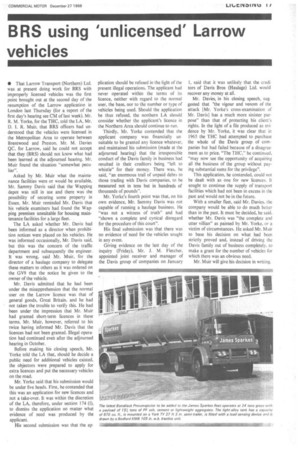BRS using 'unlicensed' Larrow vehicles
Page 19

If you've noticed an error in this article please click here to report it so we can fix it.
• That .Larrow Transport (Northern) Ltd. was at present doing work for BRS with
improperly licensed vehicles was the first point brought out at the second day of the resumption of the Larrow application in London last Thursday (for a report of the first day's hearing see CM of last week). Mr. R. M. Yorke, for the THC, told the LA, Mr.
D. I. R. Muir, that BRS officers had understood that the vehicles were licensed in the Metropolitan Area to operate between Brentwood and Preston. Mr. M. Davies QC. for Larrow, said he could not accept that they (BRS) should not know what had been learned at the adjourned hearing. Mr. Muir found the situation "somewhat peculiar".
Asked by Mr. Muir what the maintenance facilities were or would be available, Mr. Sammy Davis said that the Wapping depot was still in use and there was the possibility of securing some property in Essex. Mr. Muir reminded Mr. Davis that his vehicle examiners had found the Wapping premises unsuitable for housing maintenance facilities for a large fleet.
The LA asked whether Mr. Davis had been informed as a director when prohibition notices were placed on his vehicles. He was informed occasionally, Mr. Davis said, but this was the concern of the traffic department and subsequently the engineer. It was wrong, said Mr. Muir, for the director of a haulage company to delegate these matters to others as it was ordered on the GV9 that the notice be given to the owner of the vehicle.
Mr. Davis admitted that he had been under the misapprehension that the normal user an the Larrow licence was that of general goods, Great Britain, and he had not taken the trouble to verify this. He had been under the impression that Mr. Muir had granted short-term licences in these terms. Mr. Muir, however, referred to his twice having informed Mr. Davis that the licences had not been granted. Illegal operation had continued even after the adjourned hearing in October.
Before making his closing speech, Mr. Yorke told the LA that, should he decide a public need for additional vehicles existed, the objectors were prepared to apply for extra licences and put the necessary vehicles on the road.
Mr. Yorke said that his submission would be under five heads. First, he contended that this was an application for new licences and not a take-over. It was within the discretion of the LA, therefore, under section 174 (I), to dismiss the application no matter what evidence of need was produced by the applicant.
His second submission was that the ap plication should be refused in the light of the present illegal operations. The applicant had never operated within the terms of its licence, neither with regard to the normal user, the base, nor to the number or type of vehicles being used. Should the application be thus refused, the northern LA should consider whether the applicant's licence in the Northern Area should continue to run.
Thirdly, Mr. Yorke contended that the applicant company was financially unsuitable to be granted any licence whatever, and maintained his submission (made at the adjourned hearing) that the irresponsible conduct of the Davis family in business had resulted in their creditors being "left to whistle" for their money. There was, he said, "an enormous trail of unpaid debts to those trading with Davis companies, to be measured not in tens but in hundreds of thousands of pounds".
Mr. Yorke's fourth point was that, on his own evidence, Mr. Sammy Davis was not capable of running a haulage business. He "was . not a witness of truth" and had "shown a complete and cynical disregard for the procedure of this court".
His final submission was that there was no evidence of need for the vehicles sought in any event.
Giving evidence on the last day of the inquiry (Friday), Mr. J. M. Fletcher, appointed joint receiver and manager of the Davis group of companies on January 1, said that it was unlikely that the creditors of Davis Bros (Haulage) Ltd. would recover any money at all.
Mr. Davies, in his closing speech, suggested that the vigour and venom of the attack (Mr. Yorke's cross-examination of Mr. Davis] has a much more sinister purpose" than that of protecting his client's rights. In the light of a file produced as evidence by Mr. Yorke, it was clear that in 1965 the THC had attempted to purchase the whole of the Davis group of companies but had failed because of a disagreement as to price. "The THC," he continued, "may now see the opportunity of acquiring all the business of the group without paying substantial sums for the privilege".
This application, he contended, could not be dealt with as one for new licences. It sought to continue the supply of transport facilities which had not been in excess in the past and would not be in the future.
With a smaller fleet, said Mr. Davies, the company would be able to do much better than in the past. It must be decided, he said, whether Mr. Davis was "the complete and utter villian" as painted by Mr. Yorke, or a victim of circumstances. He asked Mr. Muir to base his decision on what had been strictly proved and, instead of driving the Davis family out of business completely, to make a grant for the number of vehicles for which there was an obvious need.
Mr. Muir will give his decision in writing.












































































